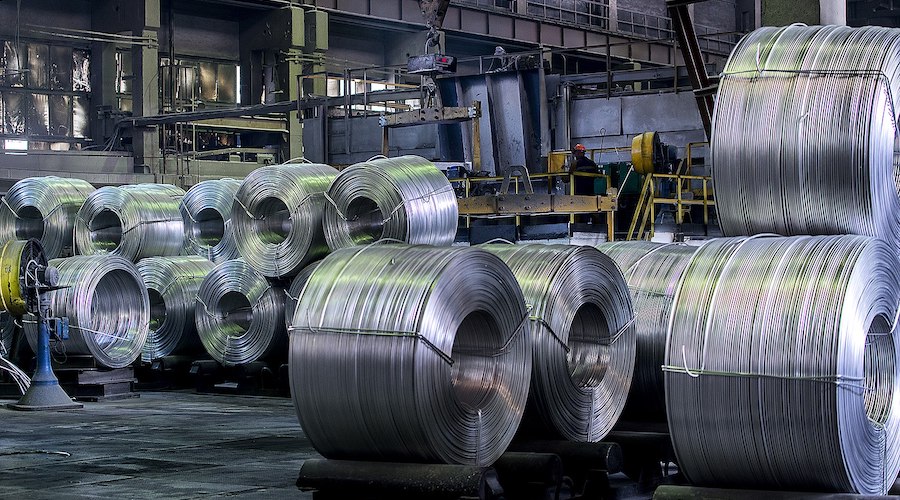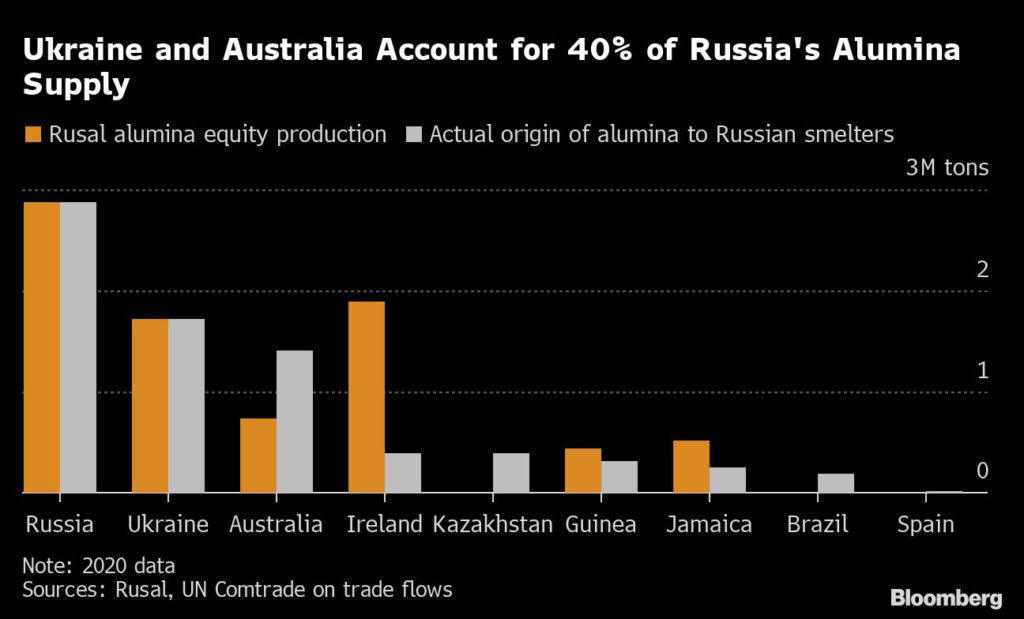Australian export ban pushes up aluminum prices, may boost inflation

Australia’s ban on alumina exports to Russia is heaping more pressure on aluminum giant United Co. Rusal International PJSC and pushing up prices of the most widely used base metal.
Aluminum jumped and Moscow-based Rusal’s shares dropped after Australian Prime Minister Scott Morrison announced the immediate ban on Sunday. Australia supplies almost 20% of Russia’s alumina — the key ingredient for producing aluminum — and its exports of aluminum ores, including bauxite, to the country have also been prohibited.
While aluminum hasn’t been targeted by sanctions, Rusal — which needs bauxite and alumina to feed its plants — faces disruption to its supply chains as Russia becomes isolated from the world economy. Supplies of the metal that’s used in everything from cans to airplanes to window frames were already running low before the Ukraine war threw commodity markets into turmoil.
Morrison said that a ship due to dock to collect a load of alumina bound for Russia would not deliver its cargo. Russia is a key supplier of aluminum to markets including Turkey, China and Japan, and the ban threatens to add even more inflationary pressure to the global economy.
Aluminum jumped as much as 5.1% to $3,554 a ton and traded at $3,504 by 9:57 a.m. on the London Metal Exchange. Prices hit a record earlier this month are up 25% this year. Rusal’s shares dropped 5.4% in Hong Kong.
Rusal said in a statement that it was evaluating the impact of the ban. It owns a 20% stake in Queensland Alumina Ltd., which is operated by Rio Tinto Group, and is entitled to the same proportion of production. It’s likely that Rio will continue supplying that metal to Rusal for now, unless the government directly prohibts it.
Rio said it would comply with all of Canberra’s directions and reiterated that it was in the process of terminating its commercial relationships with Russian businesses. Rio plans to stop supplying bauxite to, and buying alumina from, Rusal’s Aughinish plant in Ireland, people familiar with the matter said earlier this month.

Rusal has also slashed output from its Nikolaev alumina refinery in Ukraine due to logistical and transport challenges arising from the war.
Whether the company will cut aluminum output will depend on the volumes of its alumina inventories, Guotai Junan Futures Co. said. Covid-19 outbreaks in China are also disrupting supplies of the metal, adding to upward pressure on global prices, it said.
Australia said the ban would apply to “all relevant shipments” to Russia. It’s common practice for alumina producers to swap cargoes with other suppliers in different locations to save on freight costs. However, it’s unclear if Rusal will be able to get around the prohibition by doing this with shipments from its Queensland plant.
“The spirit of the sanctions announced would probably suggest that Rusal won’t be allowed to profit financially from alumina sales at all, but this is unclear in the current wording,” Gavin Wendt, a senior resources analyst at consultancy Mine Life Pty, said by email.
Rusal was founded by Russian tycoon Oleg Deripaska, who retains an interest via his shareholding in Rusal’s majority owner En+ Group International PJSC. The Australian government this month announced a new round of sanctions against oligarchs close to President Vladimir Putin, including Deripaska.
EN+ Group said earlier this month it was considering a potential carve out of Rusal’s international business, creating a new company to house its alumina, bauxite and aluminum assets across the globe which would no longer have any Russian ownership.
In other base metals, copper fell 0.8% to $10,249.50 a ton, reversing some of last week’s advance. Nickel slid by the daily limit for a fourth straight session on the LME as prices continue their retreat after spiking earlier this month in an unprecedented short squeeze.
(By Thomas Biesheuvel and James Thornhill, with assistance from Jack Farchy, Jackie Edwards, Martin Ritchie and Winnie Zhu)
{{ commodity.name }}
{{ post.title }}
{{ post.date }}




Comments